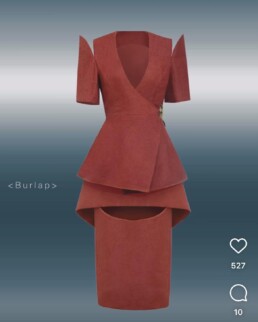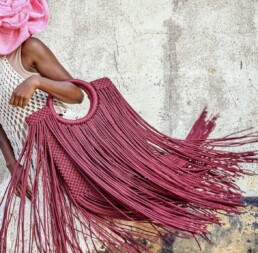FOUR 2024 FASHION TRENDS BRANDS NEED TO KNOW.
Since time immemorial, the African fashion industry has been at the forefront of innovation, embracing a tapestry of trends that not only reflect global shifts, but also celebrates the rich cultural heritage of the continent. This has ensured that the continent has become one of the major influences of the global fashion industry. As it cements its place in this space, it is important to note that the possibility of this hinges on its ability to follow and tap into trends.
In this exploration of the top fashion trends for the year 2024, Fashion Africa Now delves into the dynamic intersections of fashion and technology, the enduring commitment to sustainability, the resurgence of artisanal craftsmanship, and the pivotal role of social learning in fostering industry connections. These trends would serve as a guide and blueprint to those looking to make strategic pivots in the industry.
-
A Bigger Rise in Fashion and Technology:
In the ever-evolving landscape of fashion, technology has become an integral part of the narrative, shaping the industry’s future, and African fashion brands are no different. In order to be at the top of their game, brands in the continent need to leverage technological advancements to reimagine creativity, production processes, and consumer experiences. It may be time to tap virtual fashion shows and augmented reality in retail. The synergy between fashion and tech is breaking new ground.
One of the ways African designers may merge fashion and tech, may be an astute understanding of smart textiles, sustainable tech fabrics, and innovative manufacturing processes into their collections. The fusion of traditional craftsmanship with cutting-edge technology would not only create visually stunning pieces but also showcases the adaptability and forward-thinking spirit of the African fashion scene.
This trend not only fosters innovation but also opens new avenues for collaboration, providing African designers with a global platform to showcase their tech-infused creations. As we witness this transformative era unfold, the African fashion industry stands poised to redefine the boundaries of creativity and technology.
-
Sustainability:
Sustainability has become a cornerstone of the global fashion industry, and African brands have long been champions of environmentally conscious practices. In 2024, the focus on sustainability would intensify as fashion enthusiasts and industry insiders alike recognise the importance of responsible consumption and production.
African fashion brands can draw inspiration from their roots, where practices like upcycling, ethical sourcing, and community-driven initiatives have been woven into the fabric of traditional craftsmanship. The challenge lies in amplifying these principles on a broader scale, incorporating sustainable materials and processes without compromising the cultural authenticity that defines African fashion.
By embracing sustainability on a much personal scale, African brands can not only contribute to global efforts in combating climate change, but also appeal to a growing market of environmentally conscious consumers. This not only serves as a nod to the past, but also propels the African fashion industry into a future where style and sustainability can coexist harmoniously.
-
Artisanal Craftsmanship:
In 2024, the fashion world sees a revival of appreciation for artisanal craftsmanship, placing well-tailored garments at the forefront. African designers are taking centre stage with creations that celebrate the meticulous artistry of craftsmen and craftswomen across the continent.
From intricately woven textiles to hand-embroidered details, African fashion brands are showcasing the beauty of traditional techniques. This trend not only pays homage to cultural heritage but also promotes sustainable practices by valuing quality over quantity.
Artisanal craftsmanship presents an opportunity for African designers to distinguish themselves in a global market saturated with mass-produced fashion. By highlighting the uniqueness of handmade garments, African brands can carve a niche that resonates with consumers seeking authenticity and a connection to the stories woven into each piece.
-
Social Learning:
In the interconnected world of fashion, social learning emerges as a driving force behind industry connections. Events and shows serve as catalysts for collaboration, knowledge exchange, and the forging of lasting relationships within the fashion community. African fashion brands can leverage these activations to amplify their presence on the global stage.
By participating in international and local fashion weeks, organising local events, and fostering online communities, African designers can engage with a much diverse audience. Social learning not only provides exposure, but also facilitates the exchange of ideas, trends, and techniques, propelling the fashion industry into an envious future.
As African fashion brands navigate the landscape of 2024, the convergence of fashion and technology, a steadfast commitment to sustainability, the resurgence of artisanal craftsmanship, and the importance of social learning stand out as pivotal trends. Embracing these dynamics not only positions African designers at the forefront of the global fashion industry, but also preserves and celebrates the rich tapestry of culture woven into each thread. The future of African fashion is not only stylish, but also deeply rooted in innovation, sustainability, and a collective commitment to shaping a more connected and conscious industry.
Image credits:
Cover / Designer / VANHU VAMWE / Foto / @extremephotouszim
Text Images Curation: Beatrace Angut Lorika Oola
Designer / Loza Maleombho / Foto @Loza Maleombho
Designer / MAZINYI / Foto @MAZINYI
Designer / VANHU VAMWE / Foto / @extremephotouszim
Read more on Fashion Africa Now.











